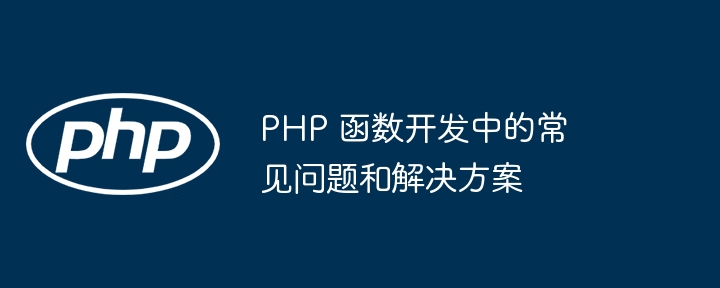Home >Backend Development >PHP Tutorial >Common problems and solutions in PHP function development
Common problems and solutions in PHP function development
- WBOYWBOYWBOYWBOYWBOYWBOYWBOYWBOYWBOYWBOYWBOYWBOYWBOriginal
- 2024-04-12 11:18:011177browse
Common problems in PHP function development include: not following naming conventions, missing parameter validation, excessive use of global variables, lack of documentation comments, and failure to handle exceptions. Solutions include: following naming conventions, validating parameters, using global variables with caution, adding documentation comments, and using try-catch blocks to handle exceptions. Follow these guidelines to create high-quality, maintainable, and efficient PHP code.

Common problems and solutions in PHP function development
In the process of PHP function development, we often encounter some common problems issues that can impact the performance, maintainability, and security of your code. This article will introduce some common PHP function development problems and their solutions.
1. Not following the naming convention
Problem: The function name does not follow the PHP naming convention, for example, does not use camel case or underscore separation word.
Solution: Follow PHP naming conventions to improve code readability and maintainability. For functions, camelCase naming is usually used, such as getFooBar().
2. Parameters are not validated
Problem: The function does not validate its parameters, resulting in unexpected or invalid input.
Solution: Use PHP built-in functions or custom code to validate function parameters. For example, for numeric parameters, you can use the is_numeric() function to validate, or throw an exception to indicate invalid input.
3. Excessive use of global variables
Problem: Excessive use of global variables by functions makes the code difficult to maintain and debug.
Solution: Use local variables whenever possible, and use global variables only when absolutely necessary. Access data in other scopes by passing parameters or using class member variables.
4. Lack of documentation comments
Problem: The function lacks documentation comments, making it difficult for other developers to understand its purpose and behavior.
Solution: Use documentation comments to document the purpose of the function, parameters, return values, and any caveats. This will help enhance the readability and maintainability of your code.
5. Not handling exceptions
Problem: The function does not handle possible exceptions, causing the application to terminate unexpectedly or generate an error message.
Solution: Use a try-catch block to handle exceptions and provide a useful error message and/or take appropriate recovery actions. For example, for database connection errors, you can use a try-catch block to handle it and retry the connection.
Practical case:
The following is an example of a function developed using PHP, which solves the above problem:
<?php
/**
* 获取商品信息
*
* @param int $product_id 商品 ID
* @return array|bool 商品信息,如果商品不存在,则返回 false
*/
function get_product_info(int $product_id)
{
// 验证参数
if (!is_numeric($product_id) || $product_id <= 0) {
throw new InvalidArgumentException('Invalid product ID');
}
// 从数据库获取商品信息
$product_info = fetch_product_from_database($product_id);
// 如果商品不存在,返回 false
if (!$product_info) {
return false;
}
return $product_info;
}In this function:
- Parameters
$product_idValidated to ensure it is a positive integer. - Use documentation comments to record the purpose, parameters, and return values of the function.
- Use try-catch blocks to handle potential database errors.
By solving these common PHP function development problems, you can write more reliable, maintainable, and performant code.
The above is the detailed content of Common problems and solutions in PHP function development. For more information, please follow other related articles on the PHP Chinese website!

